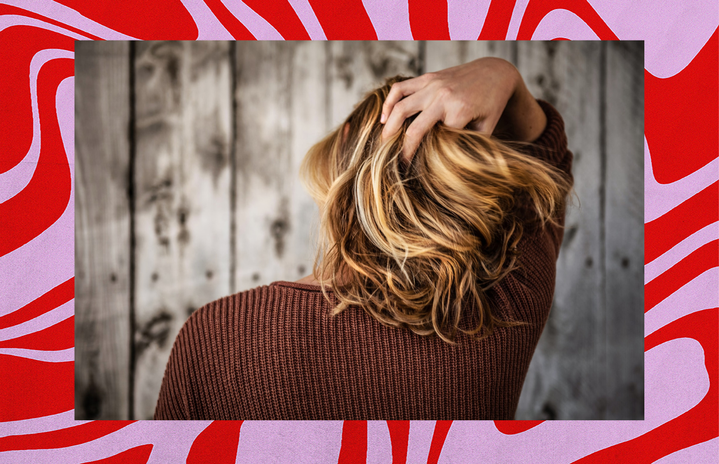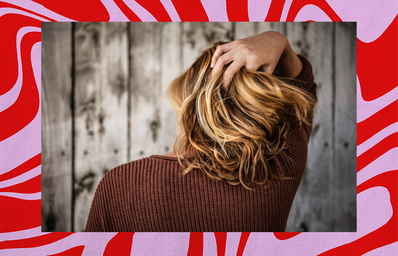There wasn’t one finite moment when I realized I was losing my hair — you just sort of start to freak out once you realize you’re seeing more and more strands at the bottom of your shower or in the bristles of your brush. I do remember that I was 19, and it was during the back-to-school season of my sophomore year of college.
Once the shedding started, so did more stressing.
Funny how an issue that’s ignited by stress can actually trigger even more worry and anxiety, but each of the five doctors I saw confirmed it: Stress was pulling my hair out by the roots and causing clumps of it to fall onto the floor. As soon as I had grasped the fact that I was dealing with stress-induced hair loss (which was way before I actually sought out the doctors), I became a nervous wreck about it. For most people, women especially, the hair on our head acts as a security blanket, an expression of ourselves and our style, and a symbol of beauty. According to a 2019 study by TYME and YouGov, over half of women in the U.S. (56%) reported that being happy about their hair positively impacts their self-esteem.
From that very same study, it was found that 29% of women felt empowered by having good hair. 20% percent of women have shed tears over a haircut they didn’t like. One in six women would be embarrassed to go out and about if there was something wrong with their hair. One in 10 would avoid going out with friends if they weren’t feeling good about their hair. And over one in three would choose not to be photographed because of — you guessed it — a bad hair day.
One in six women would be embarrassed to go out and about if there was something wrong with their hair.
I wanted a concrete reason for the loss, almost more so than a solution to the problem at the time. I figured if I at least knew what was causing my hair to fall out, I could make sure that “thing” never happened again. Then and only then would I be able to regrow my hair and move on with my life. By about the third doctor’s visit, I realized I wasn’t going to get my way with this kind of reasoning, and I wasn’t ever going to understand what initially made my body go into hair loss mode. The two general practitioners, one naturopath, and two dermatologists all agreed: Stress was the culprit here.
Quick disclaimer: There are several different types of hair loss, along with several different causes. So, my story may not sound exactly the same as yours if you too are dealing with hair loss. I also realize that I’m lucky to have the hair that I do have — so many have gone through worse when it comes to hair loss. Nevertheless, I hope others with stress-induced hair loss can take comfort in knowing they’re not alone.
All of the doctors I saw tried to comfort me and ease my worries, but I ended up sticking with one of the dermatologists who specializes in hair loss. I’ve been seeing her for about three and a half years now, and she’s helped explain what’s going on with my hair while also testing out various solutions with me.
There was a point where I was resistant to do anything to my hair because of the fallout I was experiencing.
As someone who likes (and needs) to know the who, what, why, when, and how’s of everything, it also really helped that this dermatologist was able to properly diagnose and explain to me what I was dealing with. After her initial hair-pull tests and biopsies, I was officially diagnosed with telogen effluvium hair loss. Telogen effluvium is actually quite common, with more than 200,000 cases diagnosed in the U.S. each year. You may already be familiar with it due to COVID, since many are struggling with post-COVID hair loss due to the stress the virus puts on the human body.
My dermatologist explained that it’s actually normal to lose about 100 hairs on average each day, but a person with telogen effluvium loses even more than that because their hair follicles are stuck in the telogen stage, aka the resting stage of the hair growth cycle. Sometimes, telogen effluvium is completely reversible and the shedding will subside in a matter of months. Other times, the issue can remain chronic and will keep popping back up. Chronic is the case for me.
There was a point where I was resistant to do anything to my hair because of the fallout I was experiencing. I’m talking refusing to cut it, highlight it like I normally would, change shampoos, deep condition, try a new vitamin, etc. Then, I finally got a much-needed haircut towards the end of quarantine that changed my perspective. You’d think I would’ve figured out sooner that having a lighter load of hair weighing on my shoulders actually helps the situation!
I’m still learning how to handle the fact that during and after stressful points of life, I may experience heightened hair loss.
After that, I agreed to trying some topical scalp steroids (yes, I did start out with some classic old-lady Rogaine) and scalp injections from my dermatologist. I wish I had the perfect formula of topicals and vitamins to recommend for anyone dealing with stress-induced hair loss, but it really is a find-what’s-best-for-your-body kind of situation. My current blend of hair care helpers includes two Viviscal supplements a day, a topical scalp steroid from my derm, and a medicated salicylic acid shampoo to balance out the dandruff that’s sometimes caused by the steroid.
All of these things have definitely helped, and I have so many frizzy little baby hairs popping up all over my head because of this very routine! However, still seeing hair fall out is never going to get less disheartening. I’m still learning how to handle the fact that during and after stressful points of life, I may experience heightened hair loss. The best advice I have for anyone that’s in it for the telogen effluvium long-haul is to stick to whatever hair growth routine has started to work for you, visit a doctor or dermatologist as regularly as you can if you are able, and make necessary lifestyle changes to minimize any hair loss triggering anxiety — anything to keep our lovely, luscious locks.
I still haven’t fully been able to pinpoint the big, singular, stressful event that may have triggered my telogen effluvium hair loss. It might’ve been the cross-country college transfer, or it could’ve had something to do with the weird digestive issues that were stressing me out the year before the hair fall started (real hot girl sh*t going on in this body, ladies and gents). COVID hit about a year into my hair loss journey, but it was still a stressful time that probably didn’t help my scalp much.
I’m choosing to accept that I have the power to take control of my thinking when it comes to my hair. It doesn’t have to control me.
Now, at 22, I can look back over these past few years and realize how much more stress I put myself through by sitting in the fear, worry, and panic about my hair. It really is an endless cycle, and — although I’ve gotten a bit better — it’s a cycle I’m still working to break. It makes me sad to think about how much has revolved around my hair in recent years. There was a time when I would go way too long without showering, just because I didn’t want to see all the hair fall out (for me, I experienced the most hair fall when it was wet). I also used to sit in front of a mirror for hours picking off flakes of dandruff or dry skin because I thought they were “blocking” new hairs from coming in. I wouldn’t go swimming in pools or the ocean because of how tangled my hair gets afterwards. And I wouldn’t wear my hair up in a ponytail (still working on this one). Moral of the story? My hair loss was driving me crazy because I’d let it.
I’d originally wanted to think about this part of my journey as the “aftermath,” but I’ve settled on it being the “beyond” instead — because there really is no after with this kind of hair loss. My telogen effluvium is chronic and will be triggered at varying points of stress in my life, that’s just something I have to accept. But another thing I’m choosing to accept is that I have the power to take control of my thinking when it comes to my hair. It doesn’t have to control me.
I’ll continue with my hair and scalp care routines, but I’ll also work on managing my stress levels and living a life that brings me joy. It can be tough to hear the phrase “it’s just hair,” but at the end of the day, that really is the truth. Our hair may forever be our crown, but we are so much more than just a shiny, pretty thing.


